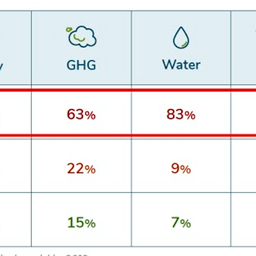A new resource dedicated to small and medium-sized digital infrastructure providers in Europe highlights the benefits of incorporating sustainability into their operations, offers a consolidated list of best practices and recommendations, and shares additional resources to help them make practical changes to save time, energy, and money.
Last November, I went to dinner in Belgrade with Jan Žorž, Desiree Milosević, and two engineers that run a small Italian ISP who wanted to learn more about sustainability. Considering that cost is top-of-mind for them as a small operator, they asked me:
- Why should they, as an operator, care about sustainability?
- What should they do to integrate sustainability into their operations in a cost-effective way?
Despite dutifully trying to answer their questions, I thought my answers weren't convincing enough.
These are great questions, and frankly, ones that largely go unanswered for smaller operators. So much of the sustainability discussion within digital infrastructure are dominated by large colo providers and the hyperscalers - in part, because of the benefits they offer to economies of scale. Yet, smaller providers still account for a significant share of the market.
It seems they could benefit from more tailored insights, so this got me curious. What if I could put something together to help them out?
"Ah, the perennial question of what SMEs can do about sustainability"
Before I started researching, I reached out to a few colleagues of mine who work on digital infrastructure and data centre sustainability. One of them, John Booth, shared the quote above, reassuring me that it is, indeed, a point of contention for small operators.
The good news, however, is that there were multiple resources out there – they had just never been compiled in one place.
A new guide for the RIPE community
After starting in November and working on it at RIPE's GreenTech Hackathon in December, I am happy to share the first edition of a new resource I compiled for the community:
This resource is my attempt to answer the questions that came up that chilly Belgrade night. It outlines why sustainability should be an important consideration for small and medium-sized operators, offers a detailed look at key resources that can help them integrate sustainability into their infrastructure and operations, features recommendations from two digital infrastructure sustainability experts, includes summaries of recommendations based on five ChatGPT queries, and provides a list of recommended readings and resources.
I cannot stress enough that one of the best things you can do is integrate sustainability throughout your operations, from design of your networks and buildings, to the servers powering them. Every bit counts, and taking a holistic approach to sustainability will always yield the most effective results – especially when coupled with impacts you can make within your community.
Next steps
As a next step, I'd love to condense this initial version into a BCOP document. In case you’d be interested in getting involved, please reach out to us or leave a comment below.
Alternatively, If you find this helpful or are struggling with this challenge, please let me know as well. The document itself was created by me as a labour of love, which is why it has a Creative Commons licence and for non-commercial reasons. I simply hope it can add value, so please let me know if you find it useful.
And remember something I echo over and over: sustainability is not just good for our communities and the planet; it’s good for business, too.







Comments 6
Jooset •
I personally think sustainability is an important goal to achieve in our industry, however RIPE NCC's efforts in this direction appear at least misguided. Instead of recommending, for example, low power devices, or manufacturers produce such devices, the output of Hackathons and other similar events sponsored by RIPE NCC (through the membership fees) can be summarized to: "I went out for a drink with my friends, had a great time, ended up with 5 ChatGPT queries, here is my consulting business, we will do a BCOP next." And this is not the first article of this kind. I would prefer membership fees be used for something more useful. Thank you in advance!
Michael Oghia •
Hi Jooset! Thank you for taking the time to read and share your thoughts. I want to clarify something about this: I wrote/compiled it on my own accord, on my own time, without a commercial premise, and started working on it in November. I mentioned the Hackathon because I co-organised it and wanted to highlight the good work that was done there, among other projects, like Ramon Bister's carbon-aware routing work. To be clear, this is not the RIPE NCC's work or something the NCC helped me with. I did it on my own with the intention of helping any small operator out there. I published it to RIPE Labs since so many of the people I thought the document would be relevant to are part of the RIPE community. Does that address your concerns?
Chris Buckridge •
Thanks, Michael, your efforts in the Green Tech Hackathon and in sharing this work are really appreciated! And it will be a sad day for this community if the spirit of volunteerism is quashed by misinformed criticism. Jooset, I'd really recommend checking out Vesna's actual update on the Green Tech Hackathon, which is a pretty long way from your characterisation: https://labs.ripe.net/author/becha/celebrating-green-tech-hackathon-results/
Vesna Manojlovic •
Jooset, thank you for your feedback. Participants in the hackathons come from the very wide RIPE community, and they invest their time and energy in contributing to the topic of Green Tech, whereas RIPE NCC membership fees have been used to cover the logistics of the event organisation, such as venue, food, and t-shirts. Some of the projects suggested more efficient devices (supercapacitors instead of batteries), while others produced IETF drafts or free software code that anyone can reuse (for DNS, BGP, or Gemini protocol improvements). In general, since 2014, hackathons have been considered a useful way to spend membership money to contribute back to the RIPE community. I am sad that you do not agree with this, but there are many views on RIPE NCC services, and I appreciate your feedback. As I mentioned in my previous response to your earlier comment, please consider joining the RIPE NCC members mailing list to discuss or suggest any changes: https://mailman.ripe.net/mailman3/lists/members-discuss.ripe.net/.
Laurence Guiot •
Thanks Michael for sharing your document on sustainability. Prompt III and IV were of great interest for me! The digital world needs urgently to think about how to reduce his impact on the planet.
Michael Oghia •
It's a pleasure, Laurence, and thank you, too, for reading and letting me know it's helpful!